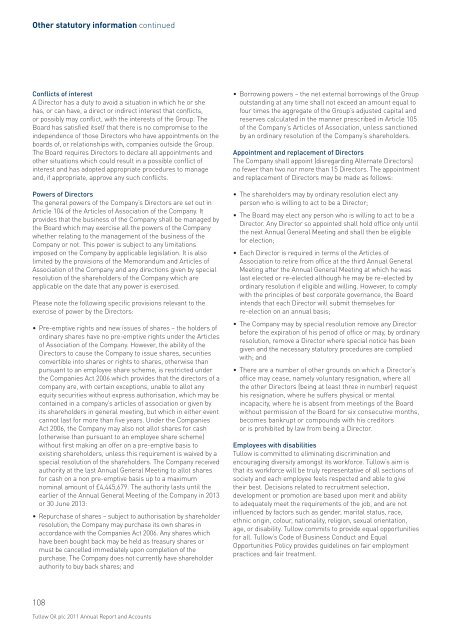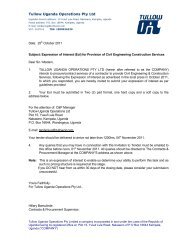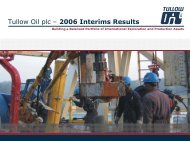2011 Annual Report PDF - Tullow Oil plc
2011 Annual Report PDF - Tullow Oil plc
2011 Annual Report PDF - Tullow Oil plc
Create successful ePaper yourself
Turn your PDF publications into a flip-book with our unique Google optimized e-Paper software.
Other statutory information continued<br />
Conflicts of interest<br />
A Director has a duty to avoid a situation in which he or she<br />
has, or can have, a direct or indirect interest that conflicts,<br />
or possibly may conflict, with the interests of the Group. The<br />
Board has satisfied itself that there is no compromise to the<br />
independence of those Directors who have appointments on the<br />
boards of, or relationships with, companies outside the Group.<br />
The Board requires Directors to declare all appointments and<br />
other situations which could result in a possible conflict of<br />
interest and has adopted appropriate procedures to manage<br />
and, if appropriate, approve any such conflicts.<br />
Powers of Directors<br />
The general powers of the Company’s Directors are set out in<br />
Article 104 of the Articles of Association of the Company. It<br />
provides that the business of the Company shall be managed by<br />
the Board which may exercise all the powers of the Company<br />
whether relating to the management of the business of the<br />
Company or not. This power is subject to any limitations<br />
imposed on the Company by applicable legislation. It is also<br />
limited by the provisions of the Memorandum and Articles of<br />
Association of the Company and any directions given by special<br />
resolution of the shareholders of the Company which are<br />
applicable on the date that any power is exercised.<br />
Please note the following specific provisions relevant to the<br />
exercise of power by the Directors:<br />
Pre-emptive rights and new issues of shares – the holders of<br />
ordinary shares have no pre-emptive rights under the Articles<br />
of Association of the Company. However, the ability of the<br />
Directors to cause the Company to issue shares, securities<br />
convertible into shares or rights to shares, otherwise than<br />
pursuant to an employee share scheme, is restricted under<br />
the Companies Act 2006 which provides that the directors of a<br />
company are, with certain exceptions, unable to allot any<br />
equity securities without express authorisation, which may be<br />
contained in a company’s articles of association or given by<br />
its shareholders in general meeting, but which in either event<br />
cannot last for more than five years. Under the Companies<br />
Act 2006, the Company may also not allot shares for cash<br />
(otherwise than pursuant to an employee share scheme)<br />
without first making an offer on a pre-emptive basis to<br />
existing shareholders, unless this requirement is waived by a<br />
special resolution of the shareholders. The Company received<br />
authority at the last <strong>Annual</strong> General Meeting to allot shares<br />
for cash on a non pre-emptive basis up to a maximum<br />
nominal amount of £4,445,679. The authority lasts until the<br />
earlier of the <strong>Annual</strong> General Meeting of the Company in 2013<br />
or 30 June 2013:<br />
Repurchase of shares – subject to authorisation by shareholder<br />
resolution, the Company may purchase its own shares in<br />
accordance with the Companies Act 2006. Any shares which<br />
have been bought back may be held as treasury shares or<br />
must be cancelled immediately upon completion of the<br />
purchase. The Company does not currently have shareholder<br />
authority to buy back shares; and<br />
Borrowing powers – the net external borrowings of the Group<br />
outstanding at any time shall not exceed an amount equal to<br />
four times the aggregate of the Group’s adjusted capital and<br />
reserves calculated in the manner prescribed in Article 105<br />
of the Company’s Articles of Association, unless sanctioned<br />
by an ordinary resolution of the Company’s shareholders.<br />
Appointment and replacement of Directors<br />
The Company shall appoint (disregarding Alternate Directors)<br />
no fewer than two nor more than 15 Directors. The appointment<br />
and replacement of Directors may be made as follows:<br />
The shareholders may by ordinary resolution elect any<br />
person who is willing to act to be a Director;<br />
The Board may elect any person who is willing to act to be a<br />
Director. Any Director so appointed shall hold office only until<br />
the next <strong>Annual</strong> General Meeting and shall then be eligible<br />
for election;<br />
Each Director is required in terms of the Articles of<br />
Association to retire from office at the third <strong>Annual</strong> General<br />
Meeting after the <strong>Annual</strong> General Meeting at which he was<br />
last elected or re-elected although he may be re-elected by<br />
ordinary resolution if eligible and willing. However, to comply<br />
with the principles of best corporate governance, the Board<br />
intends that each Director will submit themselves for<br />
re-election on an annual basis;<br />
The Company may by special resolution remove any Director<br />
before the expiration of his period of office or may, by ordinary<br />
resolution, remove a Director where special notice has been<br />
given and the necessary statutory procedures are complied<br />
with; and<br />
There are a number of other grounds on which a Director’s<br />
office may cease, namely voluntary resignation, where all<br />
the other Directors (being at least three in number) request<br />
his resignation, where he suffers physical or mental<br />
incapacity, where he is absent from meetings of the Board<br />
without permission of the Board for six consecutive months,<br />
becomes bankrupt or compounds with his creditors<br />
or is prohibited by law from being a Director.<br />
Employees with disabilities<br />
<strong>Tullow</strong> is committed to eliminating discrimination and<br />
encouraging diversity amongst its workforce. <strong>Tullow</strong>’s aim is<br />
that its workforce will be truly representative of all sections of<br />
society and each employee feels respected and able to give<br />
their best. Decisions related to recruitment selection,<br />
development or promotion are based upon merit and ability<br />
to adequately meet the requirements of the job, and are not<br />
influenced by factors such as gender, marital status, race,<br />
ethnic origin, colour, nationality, religion, sexual orientation,<br />
age, or disability. <strong>Tullow</strong> commits to provide equal opportunities<br />
for all. <strong>Tullow</strong>’s Code of Business Conduct and Equal<br />
Opportunities Policy provides guidelines on fair employment<br />
practices and fair treatment.<br />
108<br />
<strong>Tullow</strong> <strong>Oil</strong> <strong>plc</strong> <strong>2011</strong> <strong>Annual</strong> <strong>Report</strong> and Accounts

















